Indian Massage London: Wellness Tradition & Top Spots
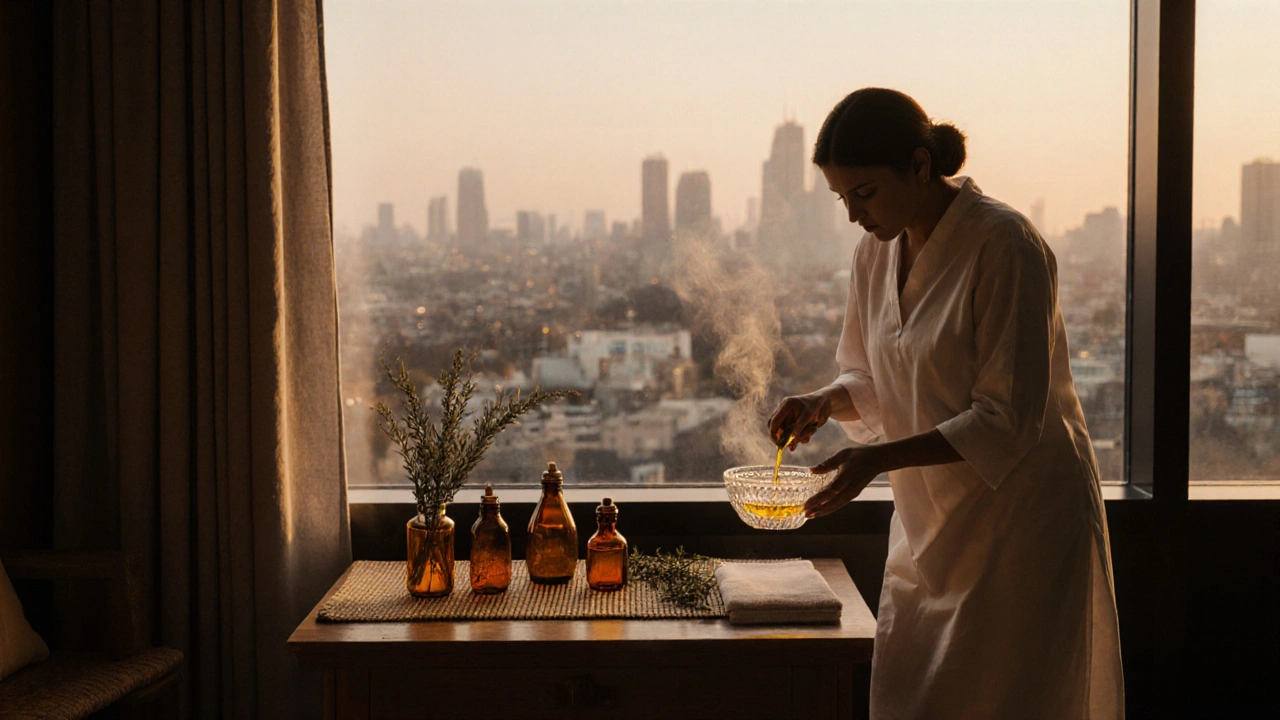
When you hear "Indian Massage London", you might picture exotic oil, calming scents, and a pause from the city’s rush. In reality, Indian massage blends ancient Ayurveda with modern wellness, offering a whole-body reset that’s both therapeutic and deeply cultural. Below you’ll find everything you need to know - from the roots of the practice to the best spots in the capital where you can try it.
Key Takeaways
- Indian massage originates from Ayurveda and focuses on balancing the body’s doshas.
- Core techniques include Abhyanga (oil massage), head massage, and Marma point work.
- London hosts a growing network of certified therapists, especially in Camden, Kensington, and Shoreditch.
- Typical sessions cost £80‑£130 and last 60‑90 minutes.
- Choosing a qualified practitioner involves checking credentials, training, and client reviews.
What Is Indian Massage?
Indian Massage is a traditional Ayurvedic bodywork that uses warm herbal oils, rhythmic strokes, and pressure on specific energy points called Marma. It dates back over 5,000 years, when Ayurvedic sages described the practice as a way to move "ama" (toxins) out of the system and restore the balance of the three doshas - Vata, Pitta, and Kapha.
Ayurveda, the broader Indian system of health, treats the body, mind, and spirit as one. By aligning your physical state with seasonal and lifestyle factors, Indian massage helps you stay in sync with nature, even in a bustling metropolis like London.
Core Techniques & Their Benefits
Three main techniques dominate the Indian massage experience:
- Abhyanga: A full-body oil massage performed with warm, medicated Ayurvedic oil (often sesame, coconut, or Brahmi‑infused). The oil penetrates deep, soothing muscles, improving circulation and skin health.
- Indian Head Massage (sometimes called Champissage): Gentle strokes on the scalp, neck, and shoulders that release tension, lower cortisol, and promote mental clarity.
- Marma Therapy: Application of pressure on 108 vital points across the body. Stimulating these points supports organ function, enhances lymphatic flow, and balances the doshas.
Research from the National Institute of Health (2023) shows that regular Abhyanga can reduce perceived stress by up to 30% and improve sleep quality by an average of 1.5 hours per night. Clients also report relief from chronic back pain, joint stiffness, and digestive issues.
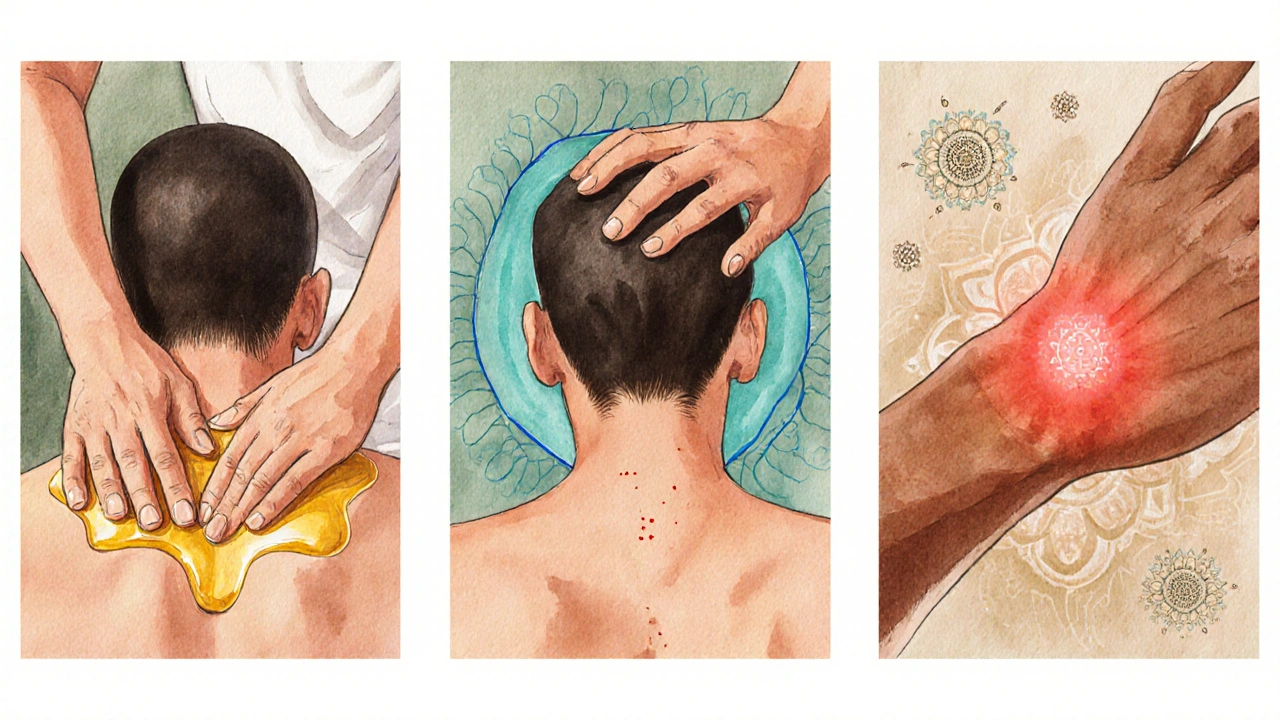
Indian Massage vs. Other Popular Modalities
| Aspect | Indian Massage (Ayurvedic) | Swedish Massage | Thai Massage | Deep Tissue |
|---|---|---|---|---|
| Primary Goal | Dosha balance, toxin removal | Relaxation, circulation | Energy line (Sen) release | Targeted muscle tension |
| Key Medium | Warm herbal oil | Light oil, light pressure | No oil, assisted stretches | Deep pressure, no oil |
| Typical Session Length | 60‑90min | 60min | 60‑120min | 45‑60min |
| Common Benefits | Stress reduction, skin health, dosha balance | General relaxation, improved flexibility | Increased energy flow, flexibility | Reduced chronic pain, improved posture |
| Ideal For | Those seeking holistic, Ayurvedic care | First‑time clients, light relaxation | Active individuals, yoga enthusiasts | Athletes, chronic pain sufferers |
Where to Experience Authentic Indian Massage in London
London’s multicultural scene means you can find genuine Ayurvedic practitioners in several neighborhoods. Below are five reputable centres that combine traditional training with modern hygiene standards.
- Ayurvedic Healing Centre - Camden: Offers daily Abhyanga sessions with certified Ayurvedic doctors. Prices start at £85 for 75min. The centre also provides post‑massage herbal tea tailored to your dosha.
- Tridosha Wellness - Kensington: Known for its private treatment rooms and bespoke oil blends (including Brahmi and Ashwagandha). Their Indian Head Massage is a client favourite, priced at £70 for 45min.
- Shanti Spa - Shoreditch: A boutique studio that blends Indian massage with aromatherapy. Their Marma therapy packages run £120 for 90min and include a follow‑up dosha assessment.
- Veda House - Southbank: Located near the river, this centre partners with Indian medical colleges to ensure therapists hold at least a Level3 Diploma in Ayurvedic Massage.
- Kalpavriksha - Notting Hill: Offers group workshops on self‑Abhyanga, perfect for couples or friends looking to learn the basics. Single sessions start at £80.
All these venues follow UK health regulations, provide clean linen, and use organic oils sourced directly from Kerala.
How to Choose a Qualified Therapist
Not every “massage therapist” has the depth of training required for authentic Ayurvedic practice. Look for these credentials:
- Completion of a recognized Ayurvedic Massage Diploma (e.g., from the National Institute of Ayurvedic Medicine, India).
- Membership in the British Association of Ayurvedic Practitioners (BAAP).
- Clear client testimonials that mention dosha assessment, oil customization, and post‑session care.
- Evidence of ongoing education - many top therapists attend annual workshops in Kerala or at the Ayurvedic Institute in the US.
A quick phone call asking “Which oil blends do you use for Vata‑dominant clients?” can reveal a practitioner’s depth of knowledge. If they can explain the reasoning, you’re likely in good hands.
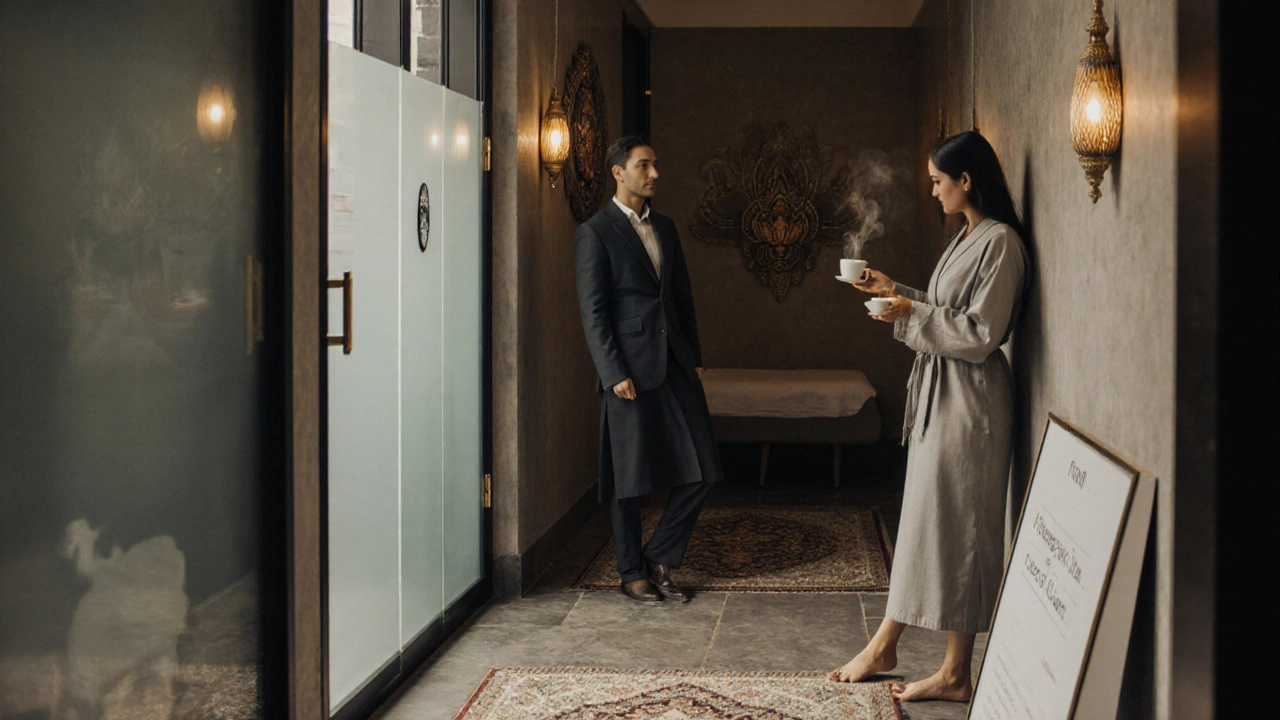
First‑Timer Tips: What to Expect
Preparing for your first Indian massage helps you get the most out of the experience.
- Do a brief dosha quiz (available on most centre websites). Knowing your dominant dosha guides oil selection.
- Arrive 10‑15minutes early for a short consultation. Therapists will ask about recent illnesses, injuries, and lifestyle.
- Dress comfortably. Most centres provide a sheet; you’ll undress to your comfort level, usually down to underwear.
- Communicate pressure preferences. Ayurvedic massage can be firm, but therapists adjust based on feedback.
- Plan post‑session care. Hydrate, avoid heavy meals for an hour, and consider a light walk to help circulation.
Typical session cost ranges from £80 to £130, depending on length, oil type, and whether Marma therapy is included. Many centres offer a “first‑visit discount” of 10% if you book online.
Next Steps & Troubleshooting
If you’ve booked but feel unsure on the day, remember that the therapist’s job is to guide you. A quick question like “Can you adjust the pressure on my lower back?” usually resolves any discomfort. Should you experience lingering soreness, a gentle self‑Abhyanga routine with warm oil at home can aid recovery.
For those interested in deeper learning, many London centres run weekend workshops on dosha‑balanced diet, yoga, and self‑massage. Signing up for these classes not only extends the benefits of your sessions but also immerses you in the broader Ayurvedic lifestyle.
Frequently Asked Questions
Is Indian massage suitable for pregnant women?
Yes, when performed by a therapist trained in prenatal Ayurvedic massage. Gentle Abhyanga with warm sesame oil can alleviate back pain and swelling, but deep Marma pressure on certain points is avoided.
How often should I get an Indian massage?
Most practitioners recommend a session every 2‑4 weeks for maintenance, and weekly sessions during periods of high stress or when balancing a dominant dosha.
What’s the difference between Indian head massage and a regular scalp massage?
Indian head massage follows specific Ayurvedic sequences that stimulate the nervous system, improve mental clarity, and balance the doshas, whereas a regular scalp massage focuses mainly on muscle relaxation.
Do I need to bring my own oil?
No. Certified centres provide therapeutic oils tailored to your dosha. If you have a specific allergy, let the therapist know ahead of time.
Can I combine Indian massage with other treatments, like acupuncture?
Absolutely. Many London wellness hubs offer integrated services. Just schedule a short gap (30‑45 minutes) between treatments to let the body settle.

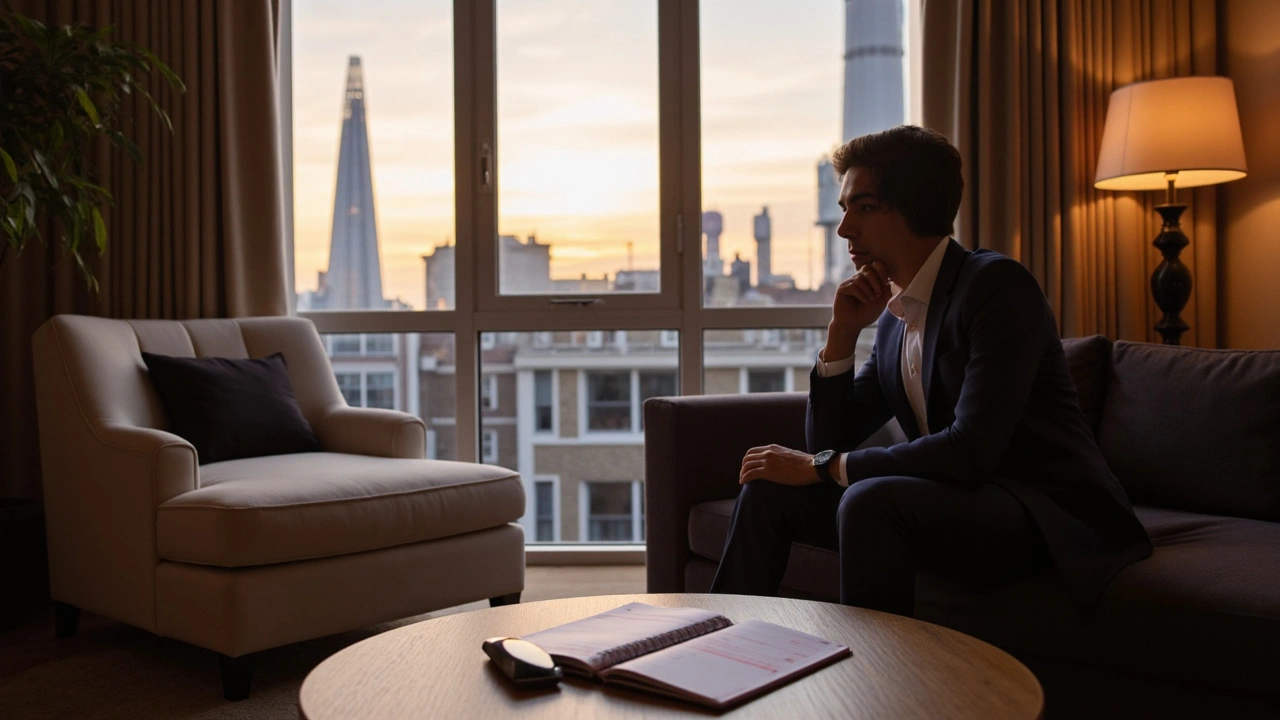
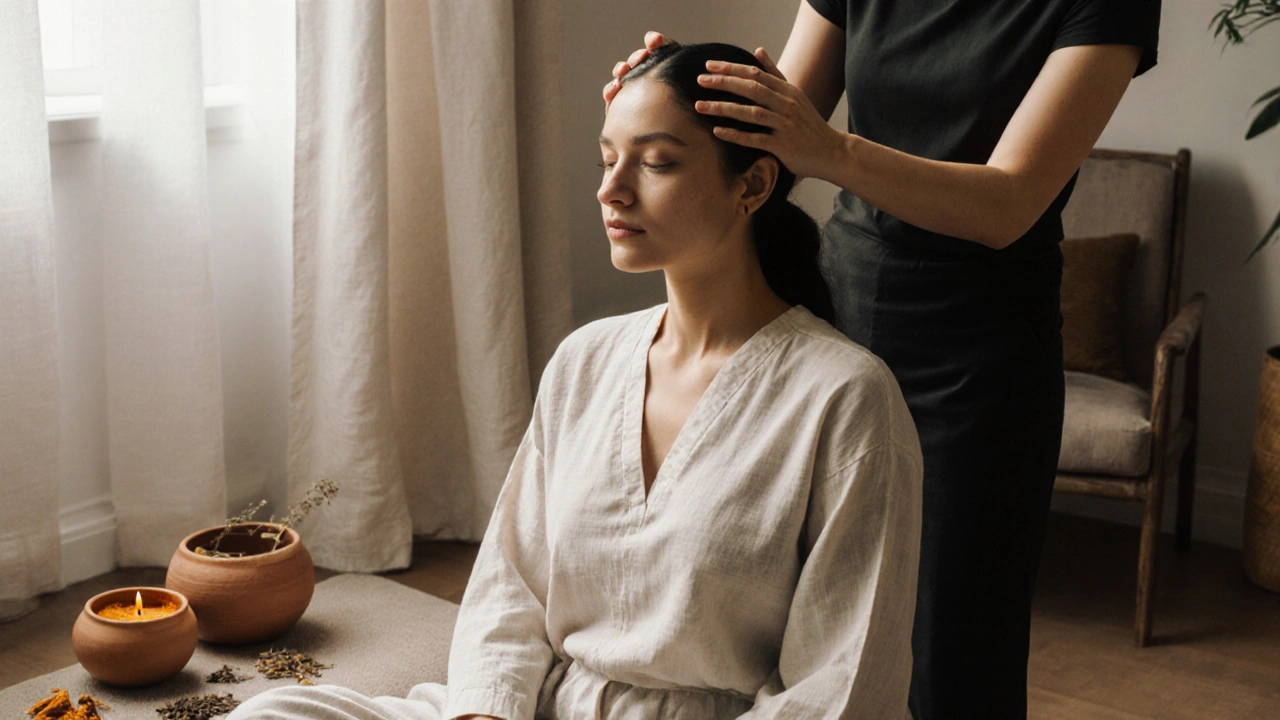
Melissa Garner
October 9, 2025 AT 18:40Love Indian massage vibes in London! 🌿
Deb O'Hanley
October 10, 2025 AT 00:46These places actually keep the Ayurvedic lineage alive. The therapists usually ask about your dosha before picking an oil, which makes a big difference. If you’re new, start with a short 45‑minute head massage to see how your body reacts.
Patti Towhill
October 10, 2025 AT 02:10Totally agree, the dosha check is a nice personal touch. It’s cool how London spots blend traditional Indian rituals with modern spa hygiene. I’ve tried the Abhyanga at Camden and felt a gentle shift in my energy.
Suman Jr
October 10, 2025 AT 14:40For anyone curious about how Indian massage fits into a busy London lifestyle, it helps to think of it as a holistic reset rather than just a luxury. First, understand that the practice is rooted in Ayurveda, which aims to balance the three doshas – Vata, Pitta, and Kapha – through oil, pressure, and breath. When you book a session, the therapist will likely start with a short consultation to determine your dominant dosha and any recent health changes. Based on that, they’ll select a warm herbal oil, often sesame or a custom blend with herbs like Brahmi or Ashwagandha, that suits your needs. During the Abhyanga portion, the oil is massaged in long, rhythmic strokes, encouraging circulation and helping to move “ama,” the toxins that Ayurveda says accumulate in the body. The head massage, or Champissage, follows a specific sequence that stimulates points on the scalp, neck, and shoulders, which can lower cortisol levels and sharpen mental clarity. Marma therapy, on the other hand, targets 108 vital points; applying gentle pressure here supports organ function and lymphatic flow. Research published by the National Institute of Health in 2023 showed that regular Abhyanga can cut perceived stress by up to 30 percent and add an average of 1.5 hours of sleep per night – impressive numbers for a city that never sleeps. If you’re dealing with chronic back pain or digestive issues, these sessions can provide noticeable relief, especially when combined with proper post‑massage hydration and light movement. Many London centres, like the Ayurvedic Healing Centre in Camden or Tridosha Wellness in Kensington, also offer follow‑up herbal teas tailored to your dosha, which reinforces the detoxifying effects. For newcomers, I recommend starting with a 60‑minute session once a month, then adjusting frequency based on how you feel; some clients move to bi‑weekly visits during high‑stress periods. Remember to communicate pressure preferences – while Ayurvedic massage can be firm, the therapist should always stay within your comfort zone. Finally, if you enjoy the experience, consider joining a weekend workshop on self‑Abhyanga; learning to oil yourself at home can extend the benefits throughout the week.
David McAlister
October 11, 2025 AT 04:33Great rundown, especially the tip about the post‑massage herbal tea – I hadn’t realized that many studios include it. Adding a self‑Abhyanga routine at home really cements the effects, and the dosha‑specific oils keep things personalized. 😊
Taylor Bayouth
October 11, 2025 AT 18:26The self‑Abhyanga suggestion is practical and easy to adopt. Consistency is key for lasting benefits.